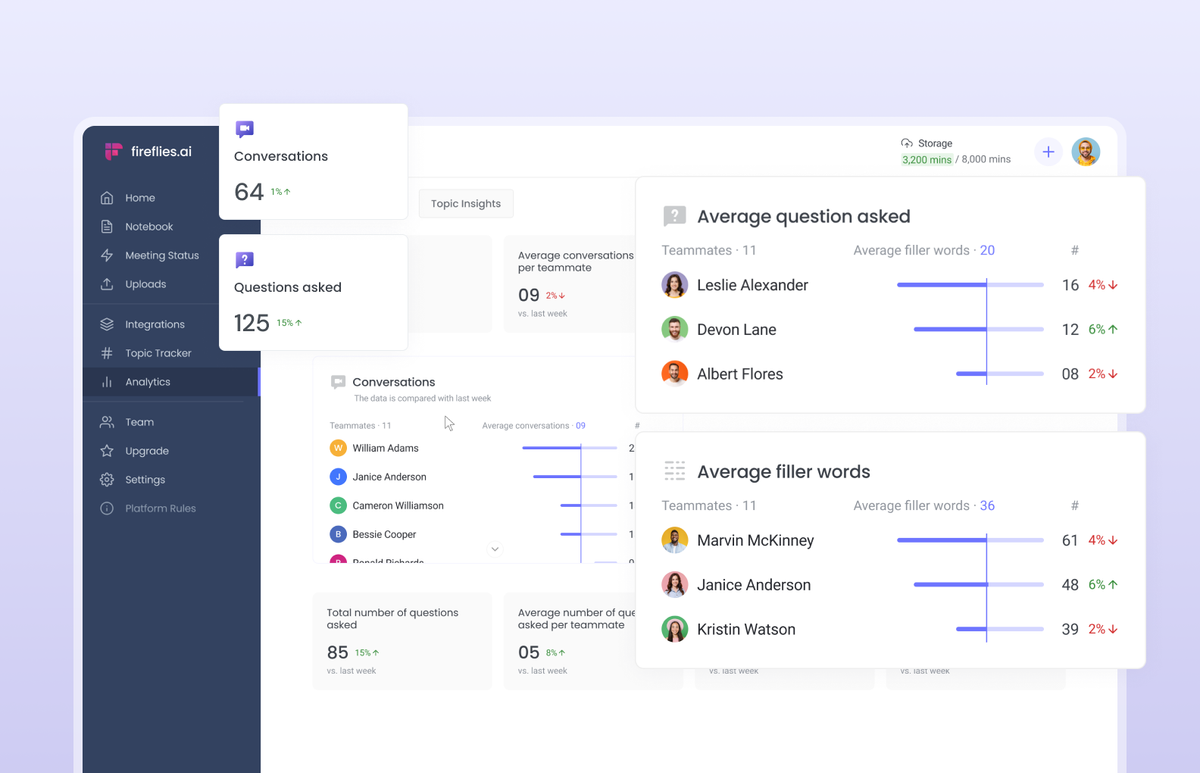Evaluating the performance of your sales team is akin to taking a pit stop during a long road trip. It's a moment to refuel, ensure you're on the right track, and plan the next leg of the journey. It is essential for your team's continuous improvement and growth.
In this comprehensive guide, we'll explore the critical topic of evaluating sales teams using key metrics. We'll dive into which performance metrics matter most, how to collect and interpret data, and why this is crucial for businesses seeking to optimize their sales processes and boost revenue.
1. The essential metrics

Assessing your sales team's performance starts with understanding the key metrics relevant to your business. These metrics, also known as Key Performance Indicators (KPIs), offer a clear snapshot of your team's performance and the areas that need attention. Let's identify the fundamental metrics that should be on your radar:
- Sales Revenue: It's the most straightforward metric. This figure represents the revenue generated by your sales team and serves as a clear indicator of overall performance. Any fluctuations in revenue should set off alarms.
- Sales Conversion Rate: This metric calculates the percentage of leads or prospects your team successfully converts into customers. A higher conversion rate signifies an effective sales process.
- Average Deal Size: This metric helps you understand the average value of deals closed by your team. It offers insights into your product pricing, customer segmentation, and the effectiveness of your sales strategies.
- Sales Cycle Length: This tracks the time it takes for a lead to become a customer. A shorter sales cycle indicates a more efficient sales process.
- Lead-to-Customer Ratio: This ratio shows how many leads are needed to acquire a new customer. A lower ratio indicates that your team is efficient at converting leads into customers.
2. Collecting and interpreting data

To evaluate your sales team effectively, you need accurate and up-to-date data. Employing the right tools and systems is crucial for efficient data collection. Here are some recommendations:
- Customer Relationship Management (CRM) Software: A CRM system helps you track customer interactions, manage leads, and monitor sales performance. It's a centralized hub for collecting leads, deals, and customer history data.
- Sales Analytics Tools: Utilize analytics tools that provide real-time insights into your sales metrics. These tools can help you identify trends, spot opportunities, and address issues as they arise.
- Data Integration: Ensure your CRM system and analytics tools are seamlessly integrated with your other business systems. This integration ensures data accuracy and consistency.
But collecting data is just the beginning; the real value lies in interpreting that data. Here's how you can analyze the metrics to gain actionable insights:
- Comparative Analysis: Compare your current metrics to historical data to uncover trends and understand whether your team's performance is improving or declining.
- Benchmarking: Compare your metrics to industry benchmarks to understand how your team stacks against competitors. This can help you identify areas where you're falling short.
- Segmentation: Analyze your data by segmenting it into categories, such as salesperson, product, or location, to pinpoint where your team excels and where there's room for improvement.
- Root Cause Analysis: If you notice a decline in a specific metric, investigate the root causes. Is it a training issue, a product problem, or a change in the market? Identifying the underlying reasons is crucial for taking corrective action.
3. Identify strengths and weaknesses

Identifying your team's strengths and weaknesses is a pivotal step in evaluating and improving their sales performance. Begin by meticulously analyzing the data at your disposal. Examine your team's performance across the key metrics mentioned earlier, such as conversion rates, sales cycle length, and lead-to-customer ratio. Are there consistent patterns emerging from this data?
Look for areas where your team excels. Perhaps they excel in closing deals with certain types of customers or in specific product lines. Acknowledge and leverage these strengths to replicate success across the board.
Conversely, identify the areas where your team is struggling. Are there recurring obstacles that hinder their performance? Common challenges might include difficulties in objection handling, long sales cycles, or difficulties with lead qualification. Recognizing these weaknesses is the first step toward implementing targeted training and strategies to address them. Ultimately, a thorough understanding of your team's strengths and weaknesses will inform your action plan for enhancing their overall performance.

4. Set clear goals

Setting clear sales goals for your team is a fundamental step in driving success. After thoroughly assessing their performance, it's time to chart the course forward.
Start by determining what you want to achieve based on your assessment. These goals need to be crystal clear – no room for ambiguity. Each goal should be specific so your team knows exactly what's expected. For example, you might set a goal to increase the sales win rate by 10% in the next quarter.
Measurability is equally important. You need to be able to track progress. If your goal is to boost revenue, specify a dollar amount. If it's about conversion rates, decide on a percentage increase.
Lastly, don't forget the "time-bound" aspect. Your goals should have a timeframe. Are you aiming to achieve these goals in a month, a quarter, or a year? The time element keeps your team focused and accountable.
In summary, setting clear, achievable, measurable, and time-bound goals will provide your team direction, motivation, and an effective way to measure their progress.
5. Sustained training and coaching

Think of your sales team as a sports team; they need training and coaching to perform at their best. Providing continuous training and coaching is like ensuring they're always at the top of their game.
Start by identifying the weaknesses and strengths revealed through your performance assessment. Are there consistent areas where your team could improve? Do they excel in specific aspects of sales? Once you've pinpointed these areas, it's time to provide tailored training and coaching. This could include sales techniques, product knowledge, objection handling, or communication skills. Equip your team with the knowledge and skills they need to excel in their roles.
Remember, the sales landscape is ever-evolving, so ongoing training is essential. Regular coaching sessions and workshops keep your team adaptable and up-to-date with the latest industry trends.
Continuous training and coaching are essential for a successful sales team. They empower your team with the tools to navigate the dynamic sales industry and consistently deliver outstanding results.

6. Regularly review and adjust strategies

Sales performance is a dynamic journey, not a static destination. It's crucial to regularly review and fine-tune your strategies and tactics to stay ahead.
Set up a regular meeting cadence for strategy reviews. This could be monthly, quarterly, or annually, depending on your industry and business objectives. During these sessions, examine how well your strategies align with current market trends and customer needs.
Stay vigilant for shifts in the market, emerging technologies, or changes in customer behavior. Are your strategies still effectively addressing these shifts, or is there room for improvement? Adjust your approach accordingly, whether that means refining your targeting, revising your messaging, or adopting new technologies. This flexibility is key to maintaining a competitive edge.
In essence, regular strategy reviews and adjustments keep your sales efforts in sync with the ever-changing currents of the market, ensuring you're always headed in the right direction.
Enhancing sales performance with Fireflies.ai

Evaluating your team's performance is a critical part of your sales journey, and that's where Fireflies steps in to make the process more efficient and effective. Our AI-powered platform is designed to be your trusty sidekick in the quest for sales excellence.
90%+ Accurate transcripts
Fireflies seamlessly integrates with popular video conferencing tools like Zoom, Microsoft Teams, and Google Meet to automatically record, transcribe, summarize, and analyze your sales conversations. It eliminates manual note-taking and lets you be present in conversations.
Uncovering actionable insights
Beyond transcriptions, Fireflies can track and uncover conversation patterns. Its conversation intelligence lets you identify red flags, talk trends, sentiments, and more. You can even track key topics that come up frequently in sales calls, such as objections, pricing, and competitors. This treasure trove of information empowers sales leaders to tailor strategies and coaching to their team's specific needs.

Create playlists for faster ramp-up
Reduce ramp up time by creating sound bites of key moments of your star performers' calls and organize them into playlists. Share these playlists with the team or use it to onboard new reps.

Extract only specific meeting intel
Fireflies lets you customize meeting summaries to review calls faster and save time. Use AI Apps to customize meeting summaries based on your desired information and save yourself from going through the entire meeting recap.

Eliminate data entry
Fireflies integrates with leading CRM and business productivity apps to eliminate data entry. After every meeting, Fireflies pushes meeting recaps to the corresponding contact in your CRM. This way, your CRM is always updated and saves precious time. Check out all the integrations here.
💡 Transform Your Sales with Fireflies!
Fireflies bridge data and action. With the insights Fireflies provides, you can easily boost your sales training, strategies, and decision-making processes.

Conclusion
Evaluating your sales team's performance is a multifaceted process that requires a combination of key metrics, data collection, analysis, and an understanding of the human element. By monitoring crucial metrics and using them to guide your team, you can make informed decisions, identify areas for improvement, and ultimately boost your sales revenue.
Your team's performance is the foundation of your business's success, and by implementing the strategies outlined in this guide, you'll be on your way to achieving greatness with your team.
Image illustrations by Freepik








